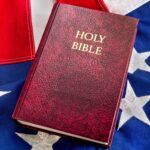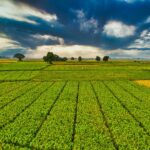
Dr. M. Elizabeth Thorpe and Producer Carl Thorpe discuss the Trump administration’s so-called Religious Liberty Commission and how it is actually a means to prop up a specific type of Christianity at the expense of other interpretations and faith traditions.
Transcript
DDM – Hello and welcome to The Priest and the Prof. I am your host, the Rev. Deborah Duguid-May.
MET – And I’m Dr. M. Elizabeth Thorpe.
DDM – This podcast is a product of Trinity Episcopal Church in Greece, New York. I’m an Episcopal priest of 26 years, and Elizabeth has been a rhetoric professor since 2010. And so join us as we explore the intersections of faith, community, politics, philosophy, and action.
MET – Hello and welcome. Producer Carl Thorpe is joining me today.
MET – On May 1, 2025, Donald Trump established the Religious Liberty Commission. This sounds auspicious – who doesn’t like a little religious liberty? But, as is historically the case, religious liberty is a bit of a misnomer. Consider what religious liberty means as we talk about it historically. We often talk about how the Pilgrims or the first European settlers were coming here for religious freedom. But that’s not exactly right. Yes, they were fleeing religious persecution, but they weren’t coming here to set up a place where people could worship freely. They set up little villages and towns where THEIR religion was the only religion and they could oppress anyone who didn’t follow their rules. And they came with violence on their minds. You might not remember, but in our Christian Nationalism episode I quoted from a sermon or two about how the whole goal of Protestantism in America was to wipe out Indigenous people. Religious liberty and freedom in America started as an exclusive and violent thing, and it’s important to keep that in mind as we think about how it is being “protected” today.
MET – So when we talk about religious liberty we have to be honest about what we mean. Certainly, there were some early Americans who believed all faiths should be treated equally. But one only has to look at early state constitutions to see that most colonial and Founding Americans saw Christianity as the faith that should most be protected by the state. Religious liberty and freedom meant freedom to be a particular kind of Christian. But at the same time, Christianity was written out of the Constitution. There was a concerted effort to keep God and king separate – and I think it’s interesting to note that there were political reasons for that.
MET – Trump’s Commission, then, may be the most historically in-line approach to religious liberty of many Presidents in a while. The Religious Liberty Commission has one goal: to fight any anti-Christian bias. It is not a commission designed to fight for the liberties of people of faith; it is a commission designed to advance Christianity, and Christiantiy means something specific to this administration. For example, Trump has already signaled his willingness to go to war with denominations like the ELCA and the Episcopalians. He has threatened, and even affected, their financial and legal situations and how they can relate to their members and the people they help. Trump is not looking to protect Christians; he is looking to protect those who support him in the name of religion.
CRT – If you remember, Trump, his team, and all of MAGA lost their collective minds when a Christian, Episcopal Bishop, Mariann Budde, exercising her religious freedom by calling on Trump to show compassion and empathy for trans children. They called for her to be fired or worse. She got death threats. Let’s not even get into their responses to Pope Francis and now Pope Leo.
CRT – But even before the current Trump administration, progressive religious speech and activity has routinely been targeted as illegal. In Pottstown, Pennsylvania, Christ Episcopal Church and Mission First Church run aid programs for the large population of people living in poverty in their small town. They provide hot meals, groceries, toiletries, and mental health counseling. The town, however, declared that they were in violation of zoning ordinances because as a church, they were only supposed to be conducting worship and activities normally associated with worship. In July of 2022, they issued a zoning ordinance violation to the churches. The churches responded by saying that serving the needy in their community is worship. It is an expression of their religion. After appealing to the town board and explaining that worship is more than showing up on Sunday mornings, the zoning violation was dismissed. However, both churches continue to receive threats of fines and other consequences of running various aid programs.
CRT – Just this year, A separate Christ Episcopal Church in Tom’s River, New Jersery also faced zoning problems when they attempted to convert part of their property into a shelter for unhoused people. After they submitted their proposal for a zoning variance, citing their deeply held religious beliefs as a primary factor for wanting to provide housing, the mayor of the town announced that he intended to force the church to sell their buildings and property to the town so he could raze the church and convert the land into a public park. Failing that, he would seize it through eminent domain. The church, their diocese, and the National church prepared for a lenghty legal battle to protect the church from the town, however the mayor’s preffered town council candidates lost their primary fights, and his majority on the town council will be eliminated come the November elections. Faced with this, the mayor backed down on his plan to take the property. However, the request for the zoning variance was denied. The church ended up deciding not to fight the town on the zoning ordinance, as they feared the legal fight necessary could put their congregation at risk.
CRT – In 2018, Scott Warren was arrested for allegedly harboring undocumented immigrants. He was part of an organization called “No More Deaths,” a non-profit organization that works to prevent deaths by migrants crossing the deserts of the Mexico-US borderlands. To that end, they hike into the wilderness and leave supplies, food, and water for immigrants to find. Warren was arrested after he found two undocumented immigrants in a barn that his group used as a base of operations. He gave them food and water and allowed them to stay for 3 days. Eventually, he and the migrants were arrested. Warren was facing felonies that could amount to twenty years in prison. Warren and his lawyers relied on Arizona’s Religious Freedom Restoriation Act. in an attempt to get the charges dismissed. He testified that he had deep religious convictions that compelled him to assist anyone who was in need. However, this did not work and his case went to trial. After a mistrial due to a hung jury, he was eventually found not guilty by a different jury. He did end up charged and found guilty of one misdemeanor for driving on a restricted road on his way to leave supplies for migrants in a nature preserve. That act also resulted in him being charged with a misdemeanor for “littering,” however the judge dismissed that as humanitarian aid with a nod to the state RFRA in his decision, as well.
CRT – There are even cases making their way through the system that take a religious freedom angle towards female reproductive health. For example, Kentucky’s intermediate court has allowed a suit to proceed involving a Jewish woman who was going through IVF to attempt to get pregnant. Her claim is that her religious belief requires that she procreate if possible and that Kentucky’s abortion ban post Dobbs is unclear as to how it applies to IVF.
CRT – In December of 2024, Indiana’s Supreme Court left in place a lower court’s injunction in favor of Hoosier Jews for Choice, a group of women who claimed that their deeply held religious beliefs would require them to get an abortion in certain cases that the law does not allow. One plaintiff claimed that a baby’s life begins when it takes its first breath, and until that time their beliefs required protecting the well-being, both physically and mentally, of the pregnant person. They also argued that their religious beliefs would require them to abort a pregnancy if testing indicated significant fetal abnormalities that would cause the baby pain or other suffering. Another argued that all people have bodily autonomy and that if a pregnancy or birth of a child would infringe on her full humanity or dignity that it would be necessary to abort. Other plaintiffs argued that they were compelled to reproduce due to their faith, but the bar on abortions that their beliefs would require in circumstances were banned, so they could not get pregnant.. Eventually, an injunction was placed on the law, but only for the specific plaintiffs in this case.
MET – There’s this story in the Bible that I return to often because I think it has a lot to tell us about power. You probably know it – the Pharisees try to trick Jesus and ask Him if people should pay taxes and Jesus asks who is on a coin. The Pharisess say, “Ceasar,” and Jesus says, “Render unto Ceaser that which is Ceasers.” Now, one of the most important lessons of this is that we know a thing belongs to someone if their image is on it. And we know we are made in God’s image; we belong to God. But ANOTHER important message here is that some things belong to Ceasar, and some things belong to God. The king (or the state) has claim to some things, and the heavenly kingdom has claim to the most important stuff.
MET – This message is getting really lost right now. There is also the story of Christ’s temptation in the desert. Satan tempts him to be the ruler of all the world, or at least of all he can see. Satan says he will make Christ a King – a mighty ruler of humanity’s world. If Jesus will just bow to Satan. And Jesus tells Satan a definitive no. It’s interesting – The gospel of Matthew tells a story of a future King in the Nativity scene, but Jesus spends so much of his life rejecting kingship. Christ wants no part of the institutionalized politics of our world. He says that is a temptation of Satan we should keep far from him.
Look, this isn’t me talking – Christ makes it very clear he wants no part of our state. He is not here to take part in our institutions of politics or government. So why do we keep trying to enshrine Him there? But at the same time, I am not telling you we that have to scrub all mention of religion from the public. It’s silly to think that we should never acknowledge the Christian roots of our society. Just as we have Greek roots. That’s the history of the West. If you want to understand Shakespeare, for example, you should probably know the Bible and Greek and Roman mythology pretty well. Protecting all faiths doesn’t mean removing Christianity from the public. It means not privileging it.CRT – One of the areas that religious freedom and infringement of religion into the state often comes up is public schools. I worked at two different public schools. The first was an elementary school where I was a paraprofessional. I saw Christian teachers who pushed the envelope as far as how much they could get away with as far as proselytizing to co-workers and even students. One year, they decided to put pictures of Christmas trees on each other’s doors. This was supposed to be a fun little game. If a tree showed up on your door, you were then supposed to make one for someone else. These trees were supposed to be decorated by the teachers themselves, but I know for a fact that at least one teacher had her students all make one. Many of the trees had overt Christian symbolizm on them. Eventually, a tree showed up on my door. Rather than continue the “game,” I decided to cover my door with images from other religious traditions that had a celebration, feastdays, etc in the winter months. When I got around to putting up an Islamic symbol, the teacher across the hall who was part of starting the Christmas Tree thing complained to the principal that my Islamic picture was offensive to her because of her religious beliefs and that her fiance was in the military. The principal told her that if Christian symbols are displayed on the wall, then other religious symbols had to be allowed. I was able to continue my ever growing display of religious symbols from around the world and varying traditions. The principal’s stance was that decisions on holiday decorations had to be content neutral. If any were allowed, all had to be allowed.
CRT – After getting my preliminary certification, I moved to a middle school in a different district to teach language arts. The novels we read from the district approved list were full of religious allusions, imagery, and symbolism. I was always careful to talk about these objectively and in a fact based manner. I noted, however, that many of the other teachers had strict policies that nothing religious could even be talked about. I don’t know how you teach excerpts from The Lion, The Witch, and the Wardrobe without talking about Christianity. You have to talk about religion when you talk about Gary Paulson’s Nightjohn, which is about an escaped slave who returns to the plantation to teach others to read as a means of liberation. I guess you could skip most of the second chapter where the narrator tells us that they weren’t allowed to pray and weren’t supposed to know anything about God. But I can’t really see how you get around talking about one of the major events of the book, and that is when Nightjohn has his toes cut off in punishment for teaching Sarny to read, and her saying “John he down for three nights” before he is back teaching her again. Eventually, Nightjohn announces that he has to leave them for a time, however he promises that he will return to them soon.Sarny doesn’t believe he will even make it out, and if he does, he won’t come back, but unlike the apostles, however, Sarny is witness to her messiah’s return from the North.
CRT – The book ends with an afterword called Words
“Late he come walking. Late in the night when they in the white house are all asleep and we be asleep and nobody can know nothing, late when the moon is down and the stars are hiding in clouds, late when it isn’t the day before and it don’t seem like ever the new day will come—that late he come walking. In the night he come walking. Late in the night and when he walks he leaves the tracks that we find in the soft dirt down by where the drive meets the road, in the soft warm dirt in the sun we see his tracks with the middle toe missing on the left foot and the middle toe missing on the right and we know. We know. It be Nightjohn. Late he come walking and nobody else knows, nobody from the big house or the other big houses know but we do. We know. Late he come walking and it be Nightjohn and he bringing us the way to know.”CRT – I don’t think it would be crazy to compare that to Mark 7:30-37, the King James Version:
“Verily I say unto you, that this generation shall not pass, till all these things be done. Heaven and earth shall pass away: but my words shall not pass away. But of that day and that hour knoweth no man, no, not the angels which are in heaven, neither the Son, but the Father. Take ye heed, watch and pray: for ye know not when the time is. For the Son of Man is as a man taking a far journey, who left his house, and gave authority to his servants, and to every man his work, and commanded the porter to watch. Watch ye therefore: for ye know not when the master of the house cometh, at even, or at midnight, or at the cockcrowing, or in the morning: Lest coming suddenly he find you sleeping. And what I say unto you I say unto all, Watch.”CRT – In Nightjohn, Sarny and the other slaves are the ones awake and waiting and watching for their Savior.
CRT – Outside of literature, how can you even teach about MLK without talking about him being a minister, without talking about how his famous speeches were sermons. You cannot hear him say “No, we are not satisfied, and we will not be satisfied until justice rolls down like waters, and righteousness like a mighty stream” without talking about Amos 5:24 which says “But let justice roll down like waters, and righteousness like an ever-flowing stream.”
CRT – These two schools show you the two extremes: one in which the teachers felt free and compelled to try and spread their Christianity and push it upon students and co-workers, and one where they were so afraid of being accused of that, that I don’t understand how they were able to teach.
MET – So that is so important to understand about how we think about religion and religious liberty and religious freedom in the public and how we see and understand that. And it is such a confusing, concept. So many people think they understand it, but most people do not. And some of that is because there are shifting narratives about how we understand this. That is because, quite frankly, we have understood it differently at different points in time. That is because the political narrative has changed, the legal narrative has changed, and I want to give you an overview of that.
MET – For example, in 1992 a somewhat moderate (by today’s standards, anyway) Court decided in Lee v. Weisman that a school could not coerce students to pray. Specifically, that mean there should not be prayer at things like graduations celebrations, commencements – all of those school sponsored events where students are supposed to be. The thing is, some of those are not technically required. So, for example, if you go to a baccalaureate celebration or event, you may not be required to be there, but it could be sort of the expected progress of your senior year. But, if there is a prayer, it is as if the government is forcing you to take part. And in 1992 we as a country decided that was unacceptable.
MET – In 2005, in McCreary v ACLU, there was a similar decision in which the Court decided that displaying the Ten Commandments in school houses and court houses violated the establishment clause and advanced religion. The state could not, according to this decision, propagate one religion over another by posting that religions’s dogma in official state spaces.
MET – Please note – this has been challenged over and over again and in the last 2-3 years has pretty much been forgotten as a number of red states in the South have passed laws requiring the Ten Commandments to be posted in classrooms.
MET – There has been a dramatic shift in national attitudes about religion and the state – but that’s not exactly true. There has been a dramatic shift in how a small group of voters and those in power think of religion and the state. It behooves us to consider why. And I think it comes back to the story of Jesus in the wilderness. The Bible is very clear that it is a corrupt and sinful temptation to combine the role of Christ with the powers of the state – Christ rebuffs Satan in the wilderness without any hesitation. But what we have in America today is a religion that embraced that temptation
MET – We see the shift in cases like Carson v. Makin, in which a family sued the state to get tuition assistance to go to a religious school. The state of Maine offered tuition assistance to go to non-sectarian private schools with the aim of all Maine children receiving a free or as close to a free education as possible. However, those who chose a religious education did not receive that help because the state did not want to support religious education because of the establishment cause. A Maine family sued and won, so now it is possible for states to support religious education.
MET – The long-term impacts of this have not panned out, yet. For example, Trump’s Commission is supposed to work against anti-Christian bias. So what happens when someone wants money for non-Christian education? Will they have support? Do they get money? The jury seems to be out on this.
MET – Another notable case is Kennedy v. Bremerton. In this case a football coach was insistent that his religion required him to pray at the 50 yard line at every game. It is important to note that he was given the opportunity to pray at any number of other locations where it could be a bit more private, but he insisted that his religion required that it be public, specifically at the 50 yard line. He insists he didn’t require anyone to join him. But all of the players, sometimes from both teams, joined. The Court decided this was not like other football cases (Santa Fe v. Doe) from decades before, which decided there should be no prayer at football games, and that it was different from Lee v. Weisman (because it wasn’t school sponsored), so this prayer was fine. This is a wild decision – think about the incidents Carl talked about earlier – people claimed taking care of immigrants or the homeless was a matter of practicing their religion – and the judicial system was incredulous. But apparently praying at the 50 yard line is a pillar of the faith. The Court has clearly made some jumps in its reasoning. And has swung around to supporting state sponsored religion.
MET – But as Christians, I think we need to be very careful about what state sponsored religion says about our religion. If we believe we need the state to support Christianity then we have acknowledged that the state is more powerful than Christ. The whole point of the resurrection is that Christ cannot be contained. Christ was executed by the state; it was a political death. But he literally conquered that. That’s like, the whole thing. The state tried to kill him, and you actually could not keep him down.
MET – So what are we saying when we tilt the scales in favor of Christianity? Do we no longer believe in Christ’s divinity? Do we no longer believe in Christ’s resurrection? There ARE places where Christians are persecuted. But being driven underground is not the same as being bothered. And this Commission is basically saying, if I, as a Christian, am bothered by other people, it means Christ needs the power of the state because my faith is not strong enough to sustain me.
MET – This goes right back to our Christian Nationalism episode. A state that wishes to enshrine a faith isn’t doing it because it believe in the faith – it is doing it to co-opt that faith and institutionalize that power. And the people who encourage that to happen are gleefully handing over the responsibilities, import, and power of their faith to the state.
MET – That’s not religious liberty; that’s acquiescence.






